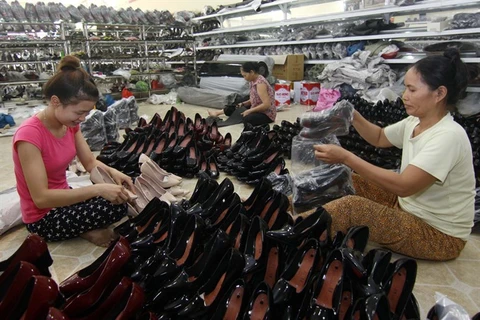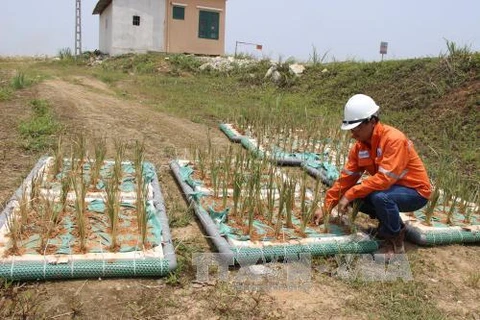Hanoi (VNA) - Local private enterprises have improved their productions and operations, but half of them still must take operational and production loans, according to the Vietnam Chamber of Commerce and Industry (VCCI).
VCCI research surveys show that Vietnamese private enterprises had developed robustly since 2000, and they had registered to operate mainly in sectors of commerce, services and construction.
Few of them had joined the production and industry sectors, and local private enterprise contribution to the domestic economy remained limited, said the VCCI.
According to the survey roughly 50 percent of local private enterprises have taken loans. Large firms commonly took big loans. They have used the loans mainly to stabilise operations, but not to invest in updating equipment and technology.
At 2 percent, the portion of enterprises using high technology is very low compared to other countries in the region. Small and medium-sized private enterprises have invested only 0.2-0.3 percent of their revenue to technology reform.
Small and medium sized enterprises (SMEs) and private firms have paid attention to quality of products and strategies on products because of high market demand.
However, SME production has continued a low technology rate and has been mainly based on labour advantages.
Meanwhile, SME managers lack skills, management knowledge and reform experience, leading to a failure to implement regulations on tax, financial management, labour, product quality and intellectual property.
Dau Anh Tuan, Head of VCCI Legal Department, said according to surveys on annual production and business results of enterprises, 65 percent of SMEs and private firms have faced difficulty in seeking for customers while 44 percent of them have had obstacles in approaching capital. In addition, they mainly have customers on the domestic market.
Local private firms have not joined deeply global supply chains, while the nation has signed free trade agreements with many other countries, Tuan said.
Vietnamese SMEs and private firms have faced limitations in approaching international standards in corporate management. Strategies for distribution, communication and trade promotion have not received reasonable investment. They have put about 1 percent of their revenue to those strategies, while foreign firms have invested 10-20 percent of their revenue in that sphere.
Local firms have also not sufficiently researched potential markets, leading to losses, he said.
Experts expect that the Law on Support for Small and Medium Sized Enterprises will partly contribute to the improving business environment and encouraging development of private enterprises.
Especially, the law will have indirect supports related to credit for local SMEs and private firms.-VNA
VCCI research surveys show that Vietnamese private enterprises had developed robustly since 2000, and they had registered to operate mainly in sectors of commerce, services and construction.
Few of them had joined the production and industry sectors, and local private enterprise contribution to the domestic economy remained limited, said the VCCI.
According to the survey roughly 50 percent of local private enterprises have taken loans. Large firms commonly took big loans. They have used the loans mainly to stabilise operations, but not to invest in updating equipment and technology.
At 2 percent, the portion of enterprises using high technology is very low compared to other countries in the region. Small and medium-sized private enterprises have invested only 0.2-0.3 percent of their revenue to technology reform.
Small and medium sized enterprises (SMEs) and private firms have paid attention to quality of products and strategies on products because of high market demand.
However, SME production has continued a low technology rate and has been mainly based on labour advantages.
Meanwhile, SME managers lack skills, management knowledge and reform experience, leading to a failure to implement regulations on tax, financial management, labour, product quality and intellectual property.
Dau Anh Tuan, Head of VCCI Legal Department, said according to surveys on annual production and business results of enterprises, 65 percent of SMEs and private firms have faced difficulty in seeking for customers while 44 percent of them have had obstacles in approaching capital. In addition, they mainly have customers on the domestic market.
Local private firms have not joined deeply global supply chains, while the nation has signed free trade agreements with many other countries, Tuan said.
Vietnamese SMEs and private firms have faced limitations in approaching international standards in corporate management. Strategies for distribution, communication and trade promotion have not received reasonable investment. They have put about 1 percent of their revenue to those strategies, while foreign firms have invested 10-20 percent of their revenue in that sphere.
Local firms have also not sufficiently researched potential markets, leading to losses, he said.
Experts expect that the Law on Support for Small and Medium Sized Enterprises will partly contribute to the improving business environment and encouraging development of private enterprises.
Especially, the law will have indirect supports related to credit for local SMEs and private firms.-VNA
VNA
























